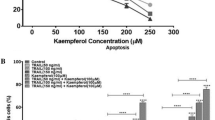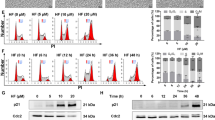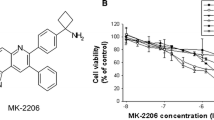Summary
Adult T cell leukemia (ATL) is an aggressive and malignant blood disease. We previously reported that steroid-structured cucurbitacin D (CuD) induces apoptosis in ATL cells. In this study, we investigated the effects of mitogen-activated protein kinase (MAPK) signaling inhibitors on CuD-induced cell death in peripheral blood lymphocytes (PBLs) isolated from ATL/acute lymphoblastic leukemia (ALL) patients and two human leukemia cell lines (MT-1 and MT-4). PBLs were isolated from an ATL/ALL patient as well as from a healthy donor. Cell surface markers were examined using flow cytometry. Serum cytokine levels were estimated using LEGENDplex or analyzed at the Center for Clinical and Translational Research of Kyushu University Hospital. Cell proliferation was assessed using the Cell Titer-Glo luminescent cell viability assay. Protein expression was determined by western blotting. PBLs from patients highly expressed CD4 and CD5. Serum from the patient contained high levels of interleukin (IL)-8, IL-10, IL-18, and interferon-γ compared to the healthy donor. CuD-induced cell death was enhanced by the mitogen-activated protein kinase kinase (MEK)1/2 inhibitor U0126. However, a c-Jun N-terminal kinase (JNK) inhibitor prevented CuD-induced cell death. Immunoblot analyses revealed that CuD reduced the phosphorylation of extracellular signal-regulated kinase (ERK), p38, and JNK, and co-treatment with CuD and U0126 did not affect the phosphorylation of ERK. MEK1/2 and p38 inhibitors enhanced CuD-induced cell death, and U0126 enhanced the CuD-induced de-phosphorylation of ERK in MT-1 and MT-4 cells. We conclude that CuD reduces ERK activation, resulting in enhanced antitumor effects on leukemic cells.





Similar content being viewed by others
Data availability
Not applicable.
Abbreviations
- ATL:
-
Adult T-cell leukemia
- CuD:
-
Cucurbitacin D
- MAPK:
-
Mitogen-activated protein kinase
- PBLs:
-
Peripheral blood lymphocytes
- IL:
-
Interleukin
- MEK:
-
Mitogen-activated protein kinase kinase
- JNK:
-
c-Jun N-terminal kinase
- ERK:
-
Extracellular signal-regulated kinase
- IFN:
-
Interferon
- TNF:
-
Tumor necrosis factor
- MCP:
-
Monocyte chemoattractant protein
References
Richard V, Nadella MV, Green PL, et al. Transcriptional regulation of parathyroid hormone-related protein promoter P3 by ETS-1 in adult T-cell leukemia/lymphoma. Leukemia. 2005;19: 1175–83
Iwanaga M, Watanabe T, Yamaguchi K. Adult T-cell leukemia: a review of epidemiological evidence. Front Microbiol 2012;3: 322
Hermine O, Ramos JC, Tobinai K. A review of new findings in adult T-cell leukemia-lymphoma: a focus on current and emerging treatment strategies. Adv Ther 2018;35: 135–52
Jayaprakasam B, Seeram NP, Nair MG (2003) Anticancer and antiinflammatory activities of cucurbitacins from Cucurbita andreana. Cancer Lett 189:11–16
Patlolla JM, Rao CV (2012) Triterpenoids for cancer prevention and treatment: current status and future prospects. Curr Pharm Biotechnol 13:147–155
He X, Gao Q, Qiang Y, Guo W, Ma Y (2017) Cucurbitacin E induces apoptosis of human prostate cancer cells via cofilin-1 and mTORC1. Oncol Lett 13:4905–4910
Ding N, Yamashita U, Matsuoka H et al (2011) Apoptosis induction through proteasome inhibitory activity of cucurbitacin D in human T-cell leukemia. Cancer 117:2735–2746
Nakanishi T, Song Y, He C et al (2016) Relationship between triterpenoid anticancer drug resistance, autophagy, and caspase-1 in adult T-cell leukemia. PeerJ. 4:e2026
Nakanishi T, Song Y, He C et al (2016) Autophagy is associated with cucurbitacin D-induced apoptosis in human T cell leukemia cells. Med Oncol 33:–30
Song Y, Ding N, Kanazawa T, Yamashita U, Yoshida Y (2013) Cucurbitacin D is a new inflammasome activator in macrophages. Int Immunopharmacol 17:1044–1050
Cardoso BA, Girio A, Henriques C et al (2008) Aberrant signaling in T-cell acute lymphoblastic leukemia: biological and therapeutic implications. Braz J Med Biol Res 41:344–350
Liu Y, Shepherd EG, Nelin LD (2007) MAPK phosphatases--regulating the immune response. Nat Rev Immunol 7:202–212
Thomas Y, Glickman E, DeMartino J, Wang J, Goldstein G, Chess L (1984) Biologic functions of the OKT1 T cell surface antigen. I. the T1 molecule is involved in helper function. J Immunol 133:724–728
Antin JH, Emerson SG, Martin P, Gadol N, Ault KA (1986) Leu-1+ (CD5+) B cells. A major lymphoid subpopulation in human fetal spleen: phenotypic and functional studies. J Immunol 136:505–510
Arlettaz L, Barbey C, Dumont-Girard F et al (1999) CD45 isoform phenotypes of human T cells: CD4(+)CD45RA(−)RO(+) memory T cells re-acquire CD45RA without losing CD45RO. Eur J Immunol 29:3987–3994
Yang T, Yao S, Zhang X, Guo Y (2016) Andrographolide inhibits growth of human T-cell acute lymphoblastic leukemia Jurkat cells by downregulation of PI3K/AKT and upregulation of p38 MAPK pathways. Drug Des Devel Ther 10:1389–1397
Ge J, Liu Y, Li Q et al (2013) Resveratrol induces apoptosis and autophagy in T-cell acute lymphoblastic leukemia cells by inhibiting Akt/mTOR and activating p38-MAPK. Biomed Environ Sci 26:902–911
Ichijo H, Nishida E, Irie K et al (1997) Induction of apoptosis by ASK1, a mammalian MAPKKK that activates SAPK/JNK and p38 signaling pathways. Science 275:90–94
Gao M, Chen G, Wang H et al (2016) Therapeutic potential and functional interaction of carfilzomib and vorinostat in T-cell leukemia/lymphoma. Oncotarget 7:29102–29115
Yu C, Rahmani M, Dent P, Grant S (2004) The hierarchical relationship between MAPK signaling and ROS generation in human leukemia cells undergoing apoptosis in response to the proteasome inhibitor Bortezomib. Exp Cell Res 295:555–566
Bastian L, Hof J, Pfau M et al (2013) Synergistic activity of bortezomib and HDACi in preclinical models of B-cell precursor acute lymphoblastic leukemia via modulation of p53, PI3K/AKT, and NF-kappaB. Clin Cancer Res 19:1445–1457
Orlowski RZ, Small GW, Shi YY (2002) Evidence that inhibition of p44/42 mitogen-activated protein kinase signaling is a factor in proteasome inhibitor-mediated apoptosis. J Biol Chem 277:27864–27871
Meriin AB, Gabai VL, Yaglom J, Shifrin VI, Sherman MY (1998) Proteasome inhibitors activate stress kinases and induce Hsp72. Diverse effects on apoptosis. J Biol Chem 273:6373–6379
Xiang D, Yuan Y, Chen L, Liu X, Belani C, Cheng H (2015) Niclosamide, an anti-helminthic molecule, downregulates the retroviral oncoprotein tax and pro-survival Bcl-2 proteins in HTLV-1-transformed T lymphocytes. Biochem Biophys Res Commun 464:221–228
Mizuguchi M, Sasaki Y, Hara T et al (2016) Induction of cell death in growing human T-cells and cell survival in resting cells in response to the human T-cell leukemia virus type 1 tax. PLoS One 11:e0148217
Salminen A, Kauppinen A, Kaarniranta K (2012) Emerging role of NF-kappaB signaling in the induction of senescence-associated secretory phenotype (SASP). Cell Signal 24:835–845
Acknowledgments
Analysis of cytokine production was partially supported by the Center for Clinical and Translational Research of the Kyushu University Hospital, Japan.
Funding
This research did not receive any specific grant from funding agencies in the public, commercial, or not-for-profit sectors.
Author information
Authors and Affiliations
Contributions
DW, NK, JT, and YY designed the clinical study and DW wrote the manuscript. DW, KM, and MS performed data collection and analysis. TK approved the clinical study and YY approved the manuscript. All authors have read and approved the final manuscript.
Corresponding author
Ethics declarations
Conflict of interest
The authors declare that they have no competing interests.
Ethics approval
This study was approved by the University of Occupational and Environmental Health, Japan (approval no. H26–034). All procedures performed in studies involving human participants were in accordance with the ethical standards of the institutional and/or national research committee and with the 1964 Helsinki declaration and its later amendments or comparable ethical standards.
Consent to participate
All patients provided written consent to participate in the study.
Consent for publication
All participants provided written consent to participate and publish the data.
Additional information
Publisher’s note
Springer Nature remains neutral with regard to jurisdictional claims in published maps and institutional affiliations.
Key points
• CuD-induced cell death was enhanced by the MEK1/2 inhibitor U0126.
• CuD can reduce ERK activation, resulting in enhanced antitumor effects in ATL cells.
Electronic supplementary material
ESM 1
(PDF 82 kb)
Rights and permissions
About this article
Cite this article
Wang, D., Shen, M., Kitamura, N. et al. Mitogen-activated protein kinases are involved in cucurbitacin D-induced antitumor effects on adult T-cell leukemia cells. Invest New Drugs 39, 122–130 (2021). https://doi.org/10.1007/s10637-020-00997-0
Received:
Accepted:
Published:
Issue Date:
DOI: https://doi.org/10.1007/s10637-020-00997-0




